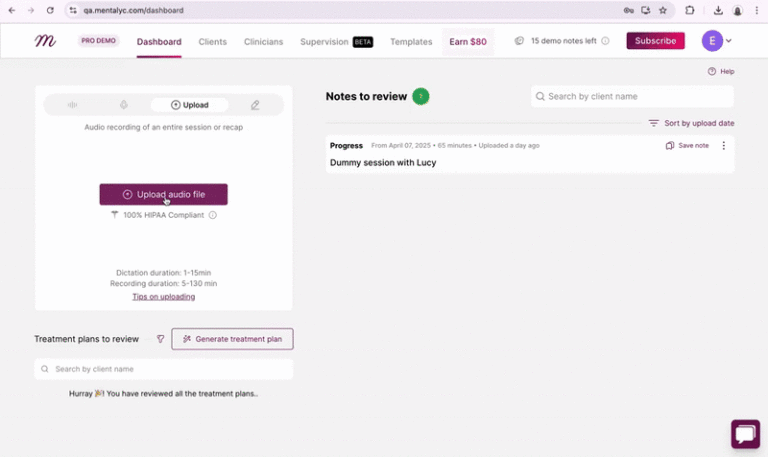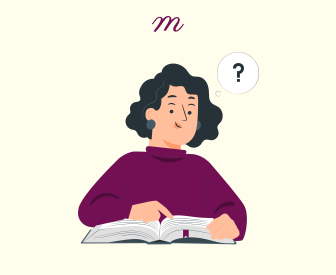Have your progress notes written for you automatically
What is Data-driven Therapy?
Data-driven therapy is a growing area of interest in the field of mental health that relies on the collection and analysis of data to inform the therapeutic process. Traditionally, therapists collect data using standardized tools such as the PHQ-9 and GAD-7, which are questionnaires that assess symptoms of depression and anxiety, respectively. However, these tools have limitations in their ability to capture the complexity of mental health conditions and do not always account for individual differences in symptom presentation.
In contrast, other areas of medicine such as neurology and cardiology have been utilizing advanced technology such as brain scans and genetic testing for years, highlighting the need for advancements in mental health care. This has led to an increasing emphasis on evidence-based practice and precision care in psychotherapy. The use of data and analytics in therapy can help identify patterns, track progress, and personalize treatment plans based on specific individual needs.
One promising development in data-driven therapy is the use of AI-powered note-taking. By automatically generating notes during therapy sessions, this technology could revolutionize the way therapists collect and analyze data. AI notes could provide a more accurate representation of the patient’s experiences, as well as assist therapists in identifying patterns and making more informed treatment decisions.
However, the use of AI notes brings an interesting debate: evidence-based practice versus practice-based evidence.
Evidence-Based Practice vs Practice-Based Evidence
The process of basing clinical judgments on the best data from research is known as “evidence-based practice” in the healthcare industry. It entails taking into account the best available external evidence from systematic research that is currently accessible and the preferences, wants, and values of the patient, as well as merging it with individual clinical experience. To guarantee that patients receive the most efficient and suitable care for their illnesses, evidence-based practice is crucial.
In contrast, practice-based evidence refers to the information that physicians learn through their regular interactions with patients. It entails gathering and studying clinical practice data to enhance patient outcomes and decision-making. Practice-based evidence acknowledges that clinical practice is not always in line with research findings and that doctors’ experience and knowledge must be taken into account in the decision-making process.
While practice-based evidence is critical in providing precision care to clients because it allows therapists to make educated judgments based on real-time data rather than relying simply on theoretical models or conventional treatment regimens. By examining clinical data, therapists may determine which therapies are most beneficial for specific clients and change their approach accordingly.
Evidence-based practice depends mostly on research evidence and is concerned with population-level statistics and the generalizability of study findings.
Depending on their clinical environment and the requirements of their patients, healthcare practitioners may decide to utilize one approach over the other, as both have strengths and limitations. In the end, they both want to give patients high-quality, efficient, and personalized treatment.
What is the current state of Psychotherapy Notes?
Psychotherapy notes, which provide a complete record of a client’s progress and treatment plan, are an essential aspect of the psychotherapy process. Yet, keeping notes during therapy sessions can be time-consuming and difficult for therapists. They must strike a balance between attentive listening and taking notes, which can disrupt the session’s flow and harm the therapeutic connection.
The documentation process can also be prone to inaccuracies and biases, resulting in erroneous client progress records. Also, typical note-taking methods might hinder therapists’ capacity to assess data and make educated judgments.
This might make it difficult to assess development over time and find patterns or areas that require further attention.
Because of the difficulties with psychotherapy notes, therapists may spend less time with clients, provide lower-quality documentation, and lack specificity in defining the client’s requirements. As a result, more efficient and effective methods of taking and evaluating psychotherapy notes are required.
How Data-Driven Therapy Can Propel Practice-Based Evidence
One such limitation of practice-based evidence is that it is difficult for therapists to spot them. It requires a lot of time to go through session notes and try to get insights from them. But with the help of AI notes, therapists could finally have access to real-life analytics that can inform their practice, rather than solely relying on a top-down approach from universities or established guidelines. These data-driven AI tools provide the opportunity for therapists to easily present their findings to the wider therapist community.
Other benefits of the data-driven approach are:
- Practice-based evidence assists therapists in continuously evaluating and improving their practice, resulting in a cycle of continuous development that leads to greater client outcomes.
- Therapists also make data-driven judgments and give clients more individualized therapy regimens.
- Data-driven therapy enables patients to benefit from more effective therapy, leading to higher success rates.
- Therapists can employ novel uses of technology to develop personalized therapy, thus improving the quality of care. The future of mental health care is likely to be personalized therapy using technology.
Data Collection Methods for a Data-driven Approach
There are several different types of data collection solutions available to therapists. These range from traditional paper-based tests to more advanced digital solutions, including software and AI-powered note-taking tools.
Pen and Paper Tests:
This is the traditional method of collecting data in psychotherapy. Therapists would provide clients with questionnaires or tests, such as the PHQ-9 or GAD-7, which they would fill out on paper. The therapist would then use this data to track the client’s progress and tailor their treatment accordingly.
Digitalized Versions of Pen and Paper Tests:
With the rise of technology, traditional paper-based tests have been digitized. These tests are now administered online, using platforms such as Google Forms. The benefit of this approach is that it is more efficient and environmentally friendly than traditional paper-based methods.
Professional Software Offering Hundreds of Batteries:
There are several software solutions available to therapists, such as Greenspace, MyOutcomes, and Blueprint. These software packages provide therapists with access to hundreds of validated questionnaires and tests, enabling them to collect a wide range of data on their client’s progress.
AI-Powered Note-taking Tools:
AI-powered note-taking apps like ELEOS, LYSSN, and Mentalyc use strong algorithms and GPT-3 models to evaluate client-therapist discussions. However, Mentalyc is the only tool tailored for private practice. These technologies can detect trends in data that therapists might otherwise miss, allowing them to modify their therapy strategy accordingly. One of the major benefits of AI-powered note-taking tools is that they can uncover “blind spots” in a therapist’s approach to treatment.
AI-Powered Note-Taking Tools
AI-powered note-taking tools are revolutionizing the practice of psychotherapy by automating documentation and offering therapists real-time insights. These technologies evaluate client-therapist dialogues, detect trends in behavior, and propose areas for improvement, thereby increasing the quality of treatment that clients get.
One of the primary advantages of AI-powered note-taking software is its ability to automate the documentation process, allowing therapists to focus more on client care. These technologies guarantee that documentation is correct and up-to-date by transcribing and analyzing sessions. Furthermore, AI-powered note-taking systems may evaluate data, giving therapists insights that would otherwise be impossible to discover, such as behavioral patterns or mental processes.
AI-powered note-taking tools can also assist therapists in customizing their approach to meet the particular needs of each client, which will eventually improve outcomes. Moreover, by implementing cutting-edge encryption and security techniques to safeguard client data, these solutions help assure compliance with privacy and security laws like HIPAA.
Despite their numerous benefits, AI-powered note-taking tools have drawbacks, such as the danger of relying too much on technology and uncertainties regarding the precision and dependability of AI algorithms. To increase the efficacy of psychotherapy and raise the standard of care for their patients, therapists should use AI in psychotherapy as a tool to aid in their practice, and still retain clinical judgment to approve and potentially adjust them before signing them off.
Here’s a table that illustrates the differences between traditional note-taking methods and AI-powered note-taking tools:
| Traditional Note-Taking | AI-Powered Note-Taking | |
| Time-saving | ❌ | ✔️ |
| Ability to detect patterns | ❌ | ✔️ |
| Real-time analysis insights | ❌ | ✔️ |
| Avoidance of human error | ❌ | ✔️ |
| Automated documentation | ❌ | ✔️ |
| Reduced administrative burden | ❌ | ✔️ |
Security with AI note-taking
Maintaining the confidentiality of client information is a top priority in the field of mental health. The Health Insurance Portability and Accountability Act (HIPAA) was enacted to ensure the security and privacy of client data. HIPAA compliance is particularly important in the context of AI-powered note-taking tools, which collect and analyze sensitive client information.
HIPAA mandates that healthcare providers protect the privacy and security of patient information. This includes information collected during therapy sessions, which is often highly sensitive and personal. Any technology used in the context of mental health treatment must be compliant with HIPAA regulations to ensure the security and privacy of client data.
AI-powered note-taking tools have advanced security measures in place to protect client data. These tools use encryption and other security protocols to ensure that client data is protected from unauthorized access. In addition, many of these tools allow therapists to customize access levels, ensuring that only authorized individuals can access client data.
AI-Scribe also enables therapists to maintain accurate and up-to-date client records. These tools can automatically transcribe and organize session notes, ensuring that documentation is complete and accurate. This not only saves time but also ensures that client records are comprehensive and consistent, which is important for providing quality care.
HIPAA compliance is critical when using AI-powered note-taking tools in mental health treatment. These tools must meet the highest standards of security and privacy to ensure the confidentiality of client data. The ability of these tools to automatically transcribe, organize, and analyze client data makes them a valuable asset for therapists, but only if they are compliant with HIPAA regulations. By using AI-powered HIPAA-compliant note-taking tools, therapists can provide their clients with the highest quality of care while maintaining the privacy and security of their information.
The Future of AI in Mental Health
The increasing popularity of AI in mental health has led to the development of AI-powered tools that are transforming psychotherapy. These tools use machine learning algorithms to analyze client-therapist conversations in real time and provide therapists with insights that can help improve the quality of care they provide.
One of the most significant advantages of AI in mental health is its ability to identify patterns and insights that may not be immediately apparent to human therapists. By analyzing vast amounts of data and providing real-time feedback, AI-powered tools can help therapists discover blind spots and improve their ability to provide individualized care to each client.
The potential for AI-powered technologies to increase psychotherapy’s efficacy is considerable. These tools can assist therapists in customizing their treatment plans to meet the specific needs of each client, resulting in better results and greater client satisfaction. AI can also help with administrative tasks, giving therapists more time to devote to patient care.
Despite the potential benefits of AI in mental health, there are also concerns about its impact on the human element of therapy. Some worry that reliance on technology could lead to a loss of empathy and the personal connection between therapists and clients. However, proponents argue that AI can enhance, rather than replace, the human element of therapy, ultimately leading to better outcomes for clients.
The future of AI in mental health is exciting, with new technologies being developed that have the potential to transform psychotherapy even further. For example, AI-powered virtual assistants could provide clients with personalized support outside of therapy sessions, while wearable devices could collect data on client behaviors and emotions to provide even more insights to therapists. As these technologies continue to evolve, AI will likely become an increasingly important tool in the field of mental health.
Conclusion
In conclusion, this article discussed the importance of data-driven psychotherapy and AI-augmented mental health care. We have highlighted the potential benefits of AI-powered note-taking tools, including automating the documentation process, identifying blind spots in therapy, and enhancing the quality of care. These tools can also assist therapists in identifying areas for growth and improvement and ultimately provide more effective and individualized therapy for clients.
HIPAA compliance is crucial when using AI-powered note-taking tools, as it ensures the privacy and security of client data. While challenges, such as the risk of overreliance on technology and concerns about the accuracy and reliability of AI algorithms, must be addressed, the potential benefits of AI in psychotherapy are significant.
The future of AI in mental health looks promising, with the potential to enhance the effectiveness of psychotherapy and improve outcomes for clients. As mental health professionals, it is crucial to embrace new technologies and strive for evidence-based practice. By utilizing data-driven approaches and adopting AI-powered note-taking tools, therapists can streamline therapy and provide precision care to clients, ultimately leading to better mental health outcomes.
Resources
- Tablan, V. (2020, April 24). Understanding the potential of data-driven digital healthcare. BDTechtalks. Retrieved February 18, 2023, from https://bdtechtalks.com/2020/04/24/data-driven-digital-healthcare/
- Brenner, B., Ph.D. (2019, Jun 11,). Data-Driven Therapy: The Future of Mental Health Care [Blog post]. Therapy Group of DC. Retrieved February 18, 2023, from https://therapygroupdc.com/therapist-dc-blog/data-driven-therapy-the-future-of-mental-health-care/










